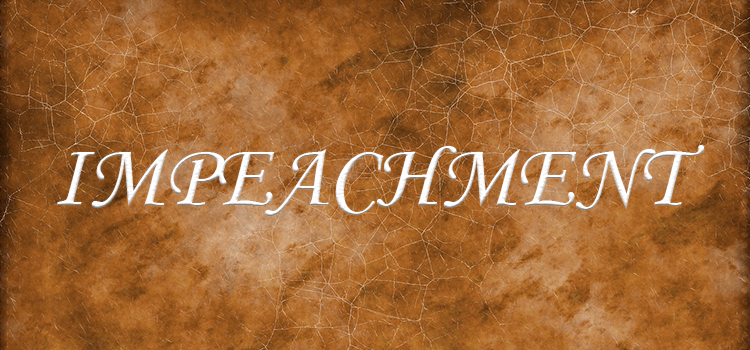What Is the Chief Justice’s Role in the Impeachment Proceedings?

Chief Justice John Roberts will be dividing his duties between the U.S. Supreme Court and Congress in the coming week. As required under the U.S. Constitution, Roberts will preside over the impeachment proceedings of President Donald Trump. As described by USA Today’s Richard Wolf, “[f]or the next several weeks, Roberts will hold down two of the most prominent and difficult jobs in America[:] The impeachment trial will consume his afternoons and, possibly, evenings;[; b]y morning, he will continue to help decideSupreme Court casesheard last fall, chooseothers to hear next spring, and presideoveroral arguments.”
Constitution Names Chief Justice Presiding Officer
As President of the Senate, the Vice President typically presides at impeachment trials.However, when a President is involved, theArticle I, Section 3 of the Constitution provides that the Chief Justiceof must preside over the proceedings.As set forth in the Constitution, “When the President of the United States is tried, the Chief Justice shall preside…” The intent is to avoid the potential conflict of interest created if the Vice President were to preside over the removal proceedings of the one person between him and thecountry’s highest office.
While the presence of the Chief Justice brings solemnity to the occasion, his role is largely ceremonial. Roberts will wear the same robe during the impeachment trial that he wears on the bench. However, the impeachment proceedings are not a judicial trial. As set forth in the Constitution, Robert’s role is simply to “preside” over the proceedings. The Constitution gives no further direction.
Senate Impeachment Rules
The Senate’s standing rules for impeachment trials set forth the authority of the presiding officer. Under the rules, the presiding officer wields significant power, including the power to issue “orders, mandates, writs, and precepts,” to “direct all the forms of proceedings while the Senate is sitting for the purpose of trying and impeachment,” and to “rule on all questions of evidence including, but not limited to, questions of relevancy, materiality, and redundancy of evidence.”
Nonetheless, the rules also largely give the Senate the final word. For instance, the presiding officer’s rulings on the admissibility of evidence overruled by a simple majority vote by the member of the Senate. The presiding officer can also defer to the Senate on issues such as the admissibility of evidence. Under the rules, the presiding officer can directly “submit any such question to a vote of the Members of the Senate.”
When the Chief Justice was sworn in as the presiding officer, he promised to “do impartial justice according to the Constitution and the laws.” While Chief Justice Roberts could play an active role in the proceedings, he is predicted to shy away from the spotlight. At his confirmation hearing, Roberts stated that judges should be like baseball umpires, impartially calling balls and strikes. “Nobody ever went to a ballgame to see the umpire,” Roberts said.
Previous Articles
SCOTUS Wraps Up Oral Arguments for the Term
by DONALD SCARINCI on May 17, 2022
The U.S. Supreme Court has concluded its oral arguments for the October 2021 Term. The justices hea...
SCOTUS Rules Censure of Elected Board Member Didn’t Violate First Amendment
by DONALD SCARINCI on May 10, 2022
In Houston Community College System v. Wilson, 595 U.S. ____ (2022), the U.S. Supreme Court held th...
Supreme Court Breach Is Not the First Involving Roe v. Wade
by DONALD SCARINCI on
The recent disclosure of Justice Samuel Alito’s decision purporting to overturn Roe v. Wade is ar...
The Amendments
-
Amendment1
- Establishment ClauseFree Exercise Clause
- Freedom of Speech
- Freedoms of Press
- Freedom of Assembly, and Petitition
-
Amendment2
- The Right to Bear Arms
-
Amendment4
- Unreasonable Searches and Seizures
-
Amendment5
- Due Process
- Eminent Domain
- Rights of Criminal Defendants
Preamble to the Bill of Rights
Congress of the United States begun and held at the City of New-York, on Wednesday the fourth of March, one thousand seven hundred and eighty nine.
THE Conventions of a number of the States, having at the time of their adopting the Constitution, expressed a desire, in order to prevent misconstruction or abuse of its powers, that further declaratory and restrictive clauses should be added: And as extending the ground of public confidence in the Government, will best ensure the beneficent ends of its institution.




